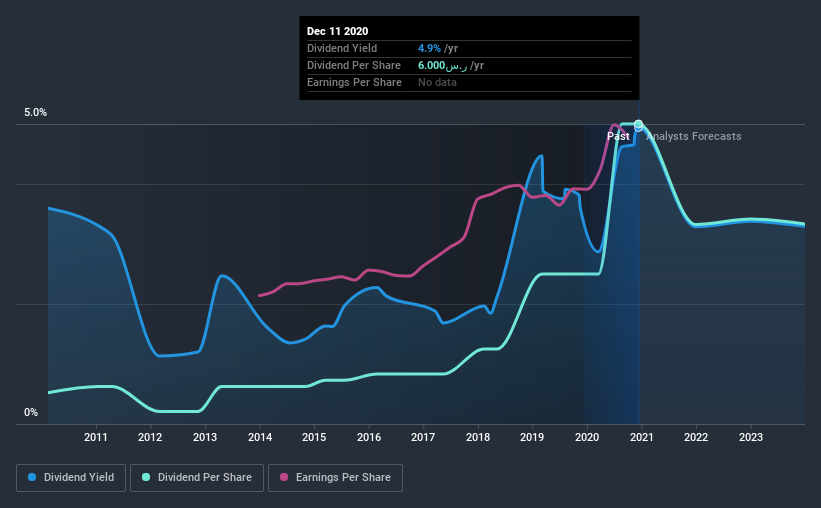- Saudi Arabia
- /
- Food and Staples Retail
- /
- SASE:4001
Is Abdullah Al-Othaim Markets Company's (TADAWUL:4001) 4.9% Dividend Worth Your Time?

Could Abdullah Al-Othaim Markets Company (TADAWUL:4001) be an attractive dividend share to own for the long haul? Investors are often drawn to strong companies with the idea of reinvesting the dividends. Unfortunately, it's common for investors to be enticed in by the seemingly attractive yield, and lose money when the company has to cut its dividend payments.
A high yield and a long history of paying dividends is an appealing combination for Abdullah Al-Othaim Markets. We'd guess that plenty of investors have purchased it for the income. When buying stocks for their dividends, you should always run through the checks below, to see if the dividend looks sustainable.
Click the interactive chart for our full dividend analysis

Payout ratios
Companies (usually) pay dividends out of their earnings. If a company is paying more than it earns, the dividend might have to be cut. As a result, we should always investigate whether a company can afford its dividend, measured as a percentage of a company's net income after tax. In the last year, Abdullah Al-Othaim Markets paid out 94% of its profit as dividends. Its payout ratio is quite high, and the dividend is not well covered by earnings. If earnings are growing or the company has a large cash balance, this might be sustainable - still, we think it is a concern.
We also measure dividends paid against a company's levered free cash flow, to see if enough cash was generated to cover the dividend. Abdullah Al-Othaim Markets paid out 70% of its cash flow as dividends last year, which is within a reasonable range for the average corporation. It's good to see that while Abdullah Al-Othaim Markets' dividends were not well covered by profits, at least they are affordable from a free cash flow perspective. Even so, if the company were to continue paying out almost all of its profits, we'd be concerned about whether the dividend is sustainable in a downturn.
While the above analysis focuses on dividends relative to a company's earnings, we do note Abdullah Al-Othaim Markets' strong net cash position, which will let it pay larger dividends for a time, should it choose.
We update our data on Abdullah Al-Othaim Markets every 24 hours, so you can always get our latest analysis of its financial health, here.
Dividend Volatility
Before buying a stock for its income, we want to see if the dividends have been stable in the past, and if the company has a track record of maintaining its dividend. For the purpose of this article, we only scrutinise the last decade of Abdullah Al-Othaim Markets' dividend payments. The dividend has been cut on at least one occasion historically. During the past 10-year period, the first annual payment was ر.س0.6 in 2010, compared to ر.س6.0 last year. Dividends per share have grown at approximately 25% per year over this time. The growth in dividends has not been linear, but the CAGR is a decent approximation of the rate of change over this time frame.
It's not great to see that the payment has been cut in the past. We're generally more wary of companies that have cut their dividend before, as they tend to perform worse in an economic downturn.
Dividend Growth Potential
With a relatively unstable dividend, it's even more important to see if earnings per share (EPS) are growing. Why take the risk of a dividend getting cut, unless there's a good chance of bigger dividends in future? Strong earnings per share (EPS) growth might encourage our interest in the company despite fluctuating dividends, which is why it's great to see Abdullah Al-Othaim Markets has grown its earnings per share at 15% per annum over the past five years. While EPS are growing rapidly, Abdullah Al-Othaim Markets paid out a very high 94% of its income as dividends. If earnings continue to grow, this dividend may be sustainable, but we think a payout this high definitely bears watching.
Conclusion
When we look at a dividend stock, we need to form a judgement on whether the dividend will grow, if the company is able to maintain it in a wide range of economic circumstances, and if the dividend payout is sustainable. We're not keen on the fact that Abdullah Al-Othaim Markets paid out such a high percentage of its income, although its cashflow is in better shape. We were also glad to see it growing earnings, but it was concerning to see the dividend has been cut at least once in the past. Ultimately, Abdullah Al-Othaim Markets comes up short on our dividend analysis. It's not that we think it is a bad company - just that there are likely more appealing dividend prospects out there on this analysis.
Market movements attest to how highly valued a consistent dividend policy is compared to one which is more unpredictable. Meanwhile, despite the importance of dividend payments, they are not the only factors our readers should know when assessing a company. For instance, we've picked out 1 warning sign for Abdullah Al-Othaim Markets that investors should take into consideration.
We have also put together a list of global stocks with a market capitalisation above $1bn and yielding more 3%.
If you decide to trade Abdullah Al-Othaim Markets, use the lowest-cost* platform that is rated #1 Overall by Barron’s, Interactive Brokers. Trade stocks, options, futures, forex, bonds and funds on 135 markets, all from a single integrated account. Promoted
New: Manage All Your Stock Portfolios in One Place
We've created the ultimate portfolio companion for stock investors, and it's free.
• Connect an unlimited number of Portfolios and see your total in one currency
• Be alerted to new Warning Signs or Risks via email or mobile
• Track the Fair Value of your stocks
This article by Simply Wall St is general in nature. It does not constitute a recommendation to buy or sell any stock, and does not take account of your objectives, or your financial situation. We aim to bring you long-term focused analysis driven by fundamental data. Note that our analysis may not factor in the latest price-sensitive company announcements or qualitative material. Simply Wall St has no position in any stocks mentioned.
*Interactive Brokers Rated Lowest Cost Broker by StockBrokers.com Annual Online Review 2020
Have feedback on this article? Concerned about the content? Get in touch with us directly. Alternatively, email editorial-team@simplywallst.com.
About SASE:4001
Abdullah Al-Othaim Markets
Engages in the wholesale and retail trade of food supplies and other products in the Kingdom of Saudi Arabia and Arab Republic of Egypt.
Solid track record and good value.
Similar Companies
Market Insights
Community Narratives



